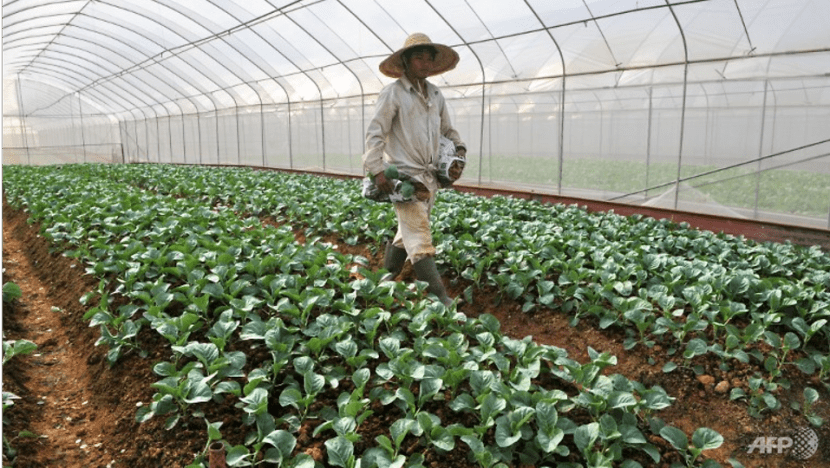'Healthy growth' in number of local food farms: Singapore Food Statistics report
The inaugural report by the Singapore Food Agency contains highlights on the progress the country has made in the last three years in building its food resilience.

SINGAPORE: There has been a "healthy growth" in the number of local food farms, from 221 in 2019 to 260 in 2021, said the Singapore Food Agency (SFA) in its inaugural Singapore Food Statistics report released on Friday (Apr 8).
More than 90 per cent of Singapore's food is imported, and local farms serve as important buffers by reducing dependence on imports during supply disruptions, said SFA.
For example, local fish farms stepped up to keep their production going during the two-week closure of Jurong Fishery Port in July 2021.
Singapore sets aside 1 per cent of its land area for food farms.
The report also highlighted the diversification of Singapore's food supply sources, from 172 countries and regions in 2019 to 180 in 2021.
"Import source diversification, complemented with local food production, hence helps us hedge against supply and price disruptions," said SFA.
DIVERSIFYING IMPORT SOURCES
Many factors could impact Singapore's food supply, including climate change, disease outbreaks, geopolitical uncertainties, global population growth and global pandemics like COVID-19, said SFA.
The agency highlighted efforts to diversify Singapore's egg supply over the past three years to mitigate supply disruptions due to farm closures. In 2021, imported eggs from alternative sources such as Thailand, Australia, Spain and Poland contributed to about 18 per cent of Singapore's egg supply, up from 2 per cent in 2019.
SFA has also approved 16 countries for the export of eggs to Singapore, up from 12 in 2019.
More than 50 per cent of hen shell eggs currently come from Malaysia, according to the report.
Singapore's major sources of commonly consumed food in 2021 include Australia (vegetables, meat), China (vegetables, fruits), Brazil (meat), Indonesia (seafood), Malaysia (vegetables, hen shell eggs, seafood, meat, fruits), Poland (hen shell eggs), South Africa (fruits) and Vietnam (seafood).
LOCAL FARMS
Singapore's agri-food sector is mainly made up of farms that produce hen shell eggs, vegetables and seafood. They contributed 30 per cent, 4 per cent and 8 per cent, respectively, to Singapore's total food consumption in 2021, according to the report.
From 2020 to 2021, "the total value of local production of these food items increased 13%, from S$163.4 million to S$185.2 million", SFA said.
The local production of hen shell eggs has increased by more than 7 per cent year-on-year and will be boosted by the development of a fourth egg farm. When it is fully operational from 2024, local farms will be able to meet about half of Singapore's demand for eggs, said the report.
FOOD SAFETY
As Singapore's food safety regulator, SFA ensures the safety of imported food through the accreditation of overseas sources for higher-risk products including meat and eggs.
It also "maintains a comprehensive and risk-based inspection process" to keep local food establishments in check. Lapses in licensing conditions, regulatory requirements, biosecurity, food safety and hygiene practices call for immediate rectification, and may lead to enforcement action, said SFA.
Non-compliance with SFA’s standards of inspection by retail food establishments remained low between 2019 and 2021, at 3 per cent on average, according to the report.
Non-retail food establishments showed a similar trend over the same period, except for central kitchens which typically saw higher non-compliance rates.
SFA said the number of foodborne illness cases related to foodborne outbreaks have been kept low, with no more than 26 such cases per 100,000 population annually over the previous three years.
In terms of food recalls, SFA effected 23 food recalls in 2021, comparable to previous years.
Editor's note: This article has been amended following a correction by SFA to its press release regarding the total value of the local production of eggs, vegetables and seafood from 2020 to 2021.














